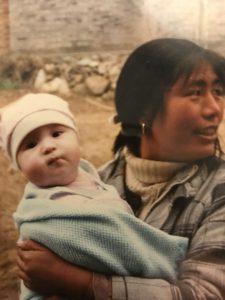Bubble Tea? Yes Please!

If you’re looking for a food fad sweeping the world, look no further than Argyle – or maybe Chinatown. It’s bubble tea! Also known as boba or milk tea, this sweet treat is a blended drink of a million different types, kinds, and sizes. It was invented in Taiwan in the 1980s and has spread globally ever since. Or at least, from the East to the West.
You can get fruit-based teas, milk teas, with tapioca pearls or without, with jelly blocks or fruit in the cup. Anything you can dream of, you can get. In Chicago, I must admit, I get it like, every week. It’s about five dollars a cup, which is about the same as my average Starbucks order, so that’s pretty nice.
But here in China? The most expensive cup at the most expensive boba stand is about three dollars. They deliver to your dorm if you want, they have punch cards upon punch cards, and in a five minute walk there are five different stands to get your boba. My favorite drink is called the ‘Panda’ – tapioca pearls, a milk cream, and oreos on top. You can customize the type of tea, the sugar amount, and the ice amount, so I usually get 100% of the normal sugar, lots of ice, and green tea.
I’m a big fan of the oreo flavor and the strawberry flavors, because traditional milk tea ‘plain’ flavor doesn’t quite cut it for me. But my roommate here is always trying to get me to try new things, so I’ve been slowly expanding my palate. Still, I’m an oreo girl through and through. For many people who perhaps didn’t drink bubble tea every week for two years, it’s often an acquired taste, earned through drinking smoothie variations on bubble tea before moving on to the milk tea-style.
When people think of Chinese food in the USA, they might think of fried rice, or General Tso’s chicken, or maybe beef and broccoli. Since I’m in an Asian-formed sorority in the States, we go out for different Asian foods all the time, including the absolutely necessary boba stop. It’s interesting because when I was last here in Beijing in 2013, bubble tea was known, but certainly not this popular. And here we are now! Since I’ve been gone for a year, I can’t speak for the situation back in Chicago, but I do know that a bubble tea location has opened up near my hometown – which is totally different, because it’s a very white town and when I was growing up, most if not all Asian restaurants were at least a twenty minute drive away.
I know I’ll be coming back from my time abroad with even more passion for this treat. Perhaps it’s not the healthiest, but Starbucks drinks here are at American prices, whereas I can get some boba for maybe $1.5. That’s a huge difference in the eyes of a college student! Maybe by the time I come back, boba will really have broken into the mainstream and be everywhere. That’s what I’m hoping for! Since the title of my blog has to do with food, I thought I’d share with you all this particular aspect of Chinese culture. And maybe now you’ll be on the lookout for boba places and give it a try, if you haven’t already!




.jpg)



